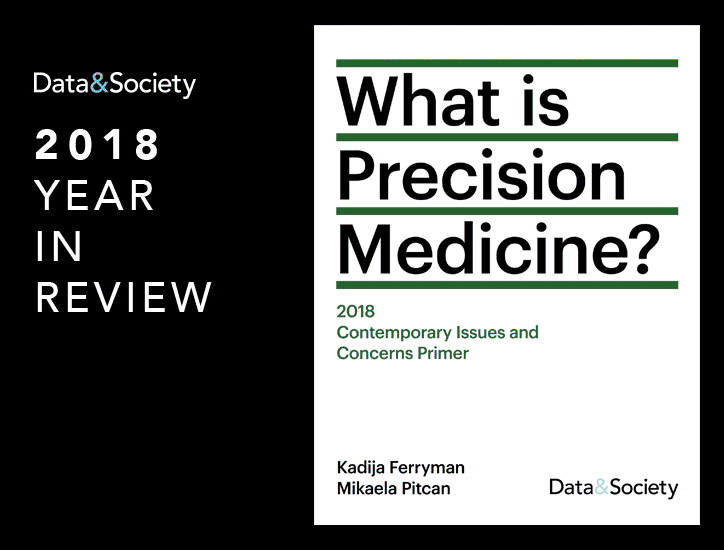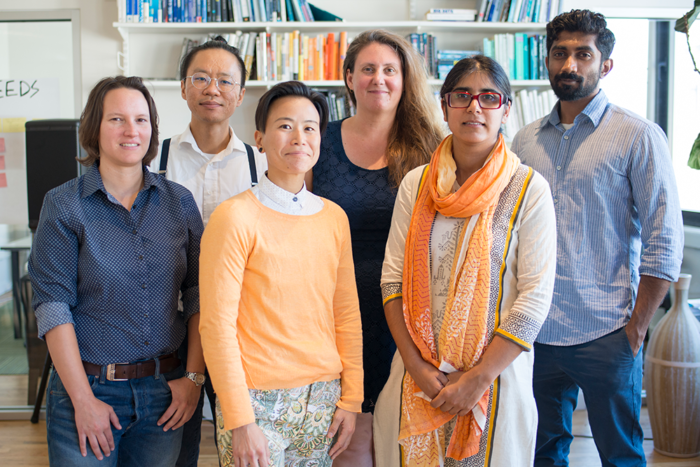
We’re taking a short winter break! We wish you a restful holiday season and hope you enjoy the reading list of select 2018 Data & Society highlights below.
For a deeper reflection on Data & Society’s research and engagement this past year, explore our digital 2017-2018 Annual Report.
On January 9, we’ll kick-off our Databite series with technologist and digital media scholar An Xiao Mina. Mina will provide a global exploration of internet memes as agents of pop culture, politics, protest, and propaganda on- and offline. RSVP here.
We look forward to seeing you in the new year!

Data & Society report: Beyond Disruption
The report Beyond Disruption, co-authored by Postdoctoral Scholar Julia Ticona and Researchers Alexandra Mateescu and Alex Rosenblat, draws from interviews with over 100 domestic and ridehailing platform workers in major U.S. cities to reveal how technology is reshaping the future of labor. The report is accompanied by a curated list of labor research readings.
Bonus: Ticona appeared on NPR to discuss key findings from the report, Rosenblat profiled it in The New York Times, and Mateescu shared insights in a Slate op-ed.
Don’t Believe Every AI You See
“Without comprehensively accounting for the strengths and weaknesses of technical practices, the work of ethics—which includes weighing the risks and benefits and potential consequences of an AI system—will be incomplete.” – Data & Society Research Lead Madeleine Clare Elish & Founder and President danah boyd, Shorenstein Center’s The Ethical Machine
Bonus: Early in 2019, we will release a new report on integrating AI systems in two U.S. work sectors.
Facebook may stop the data leaks, but it’s too late: Cambridge Analytica’s models live on
“Cambridge Analytica and its parent and sister companies were among the first to figure out how to turn behavioral algorithms into a portable worldview—a financially valuable, politically potent model of how humans behave and how society should be structured. To understand Cambridge Analytica, the anti-democratic vision it represents, and the potentially illegal behavior that its techniques may make possible, follow the models.” – Data & Society Researcher Jacob Metcalf, MIT Technology Review
Bonus: Read more of Metcalf’s take on Cambridge Analytica in Slate (here and here) and Visting Scholar Anne Washington’s analysis on Points.
Data & Society report: The Oxygen of Amplification
The Oxygen of Amplification, by Data & Society Research Affiliate Whitney Phillips, draws on in-depth interviews with journalists to showcase how news media was hijacked from 2016 to 2018 to amplify the messages of hate groups.
Phillips’s work continues to be cited in numerous outlets (The Washington Post, The Guardian, The Globe and Mail, Columbia Journalism Review).
Data & Society report: Fairness in Precision Medicine
This year’s report (Fairness in Precision Medicine), primer (What is Precision Medicine?), and data visualization (Precision Medicine National Actor Map), from the Fairness in Precision Medicine project, move past the rhetoric of promise in precision medicine to critically assess the potential for bias and discrimination in health data collection, sharing, and interpretation. Authors Postdoctoral Scholar Kadija Ferryman and Researcher Mikaela Pitcan were cited in outlets such as MIT Technology Review and The Outline.
Bonus: Ferryman and Pitcan authored the Points blogposts, Health Data Rush and The Risks of Knowing Your Risks.
Data & Society report: Alternative Influence
In Alternative Influence, Data & Society Researcher Becca Lewis identifies the Alternative Influence Network, an alternative media system that adopts the techniques of brand influencers to build audiences and “sell” them political ideology. Her research was covered and cited in over 20 different news outlets, including The New York Times, NPR, The Guardian, Harper’s, WIRED, The Verge, and Vox.
Data & Society primer: Algorithmic Accountability
Co-authored by Researchers Robyn Caplan, Joan Donovan, Lauren Hanson, and Fellow Jeanna Matthews, Algorithmic Accountability: A Primer explores issues of algorithmic accountability, or the process of assigning responsibility for harm when algorithmic decision-making results in discriminatory and inequitable outcomes.
Related: Postdoctoral Scholar Andrew Selbst co-authored the paper The Intuitive Appeal of Explainable Machines with Affiliate Solon Barocas.
The Case for Quarantining Extremist Ideas
“Media has always had the ability to publish or amplify particular voices, perspectives and incidents. In choosing stories and voices they will or will not prioritize, editors weigh the benefits and costs of coverage against potential social consequences. In doing so, they help create broader societal values. We call this willingness to avoid amplifying extremist messages ‘strategic silence’.” – Data & Society Media Manipulation Research Lead Joan Donovan & Founder and President danah boyd, The Guardian
Bonus: For more on strategic silence, read the crib of Boyd’s speech at the 2018 Online News Association Conference.
When Your Boss is an Algorithm
“I have learned that drivers at ride-hailing companies may have the freedom and flexibility of gig economy work, but they are still at the mercy of a boss — an algorithmic boss.” – Data & Society Researcher Alex Rosenblat, The New York Times
Bonus: This October, Rosenblat released her highly anticipated book Uberland: How Algorithms Are Rewriting the Rules of Work. Order it here, watch her discuss findings on Yahoo Finance, or read Adrian Chen’s review in New York Magazine.
Data & Society report: Searching for Alternative Facts
In Searching for Alternative Facts, Data & Society Postdoctoral Scholar Francesca Tripodi uses Christian practices of Biblical interpretation as a lens for understanding the relationship between so-called “alternative” or “fake news” sources and contemporary conservative political thought. The report was featured in The Washington Post and Nieman Lab and cited by The Guardian, Slate, and The American Press Institute, among others.
Bonus: Tripodi shared insights from her report in the Medium Feature blogpost, How Trump Voters Decide Who to Trust.
Need medical help? Sorry, not until you sign away your privacy
“In the era of data-driven medicine, systems for handling data need to avoid anything that feels like manipulation—whether it’s subtle or overt. At a minimum, the process of obtaining consent should be separated from the process of obtaining care.” – Data & Society Research Lead Mary Madden, MIT Technology Review
Bonus: Next year, look out for a fresh set of Data & Society primers focusing on topic areas such as health and surveillance, health and misinformation, and “healthy tech.”
Data & Society report: Governing AI
Research Lead Mark Latonero shows how human rights can serve as a “North Star” to guide the development and governance of artificial intelligence in his report, Governing AI.
Bonus: After hosting a convening to discuss the intersection of human rights and artificial intelligence, Latonero and Research Analyst Melanie Penagos curated a blog series with contributions from participants. Check it out here.

(not pictured: Marianna Bastashevski)
Data & Society 2017-2018 Fellows
In June, Data & Society’s 2017-2018 Fellows wrapped up their fellowship with presentations on their projects from the past year. Topics ranged from the distributed web of care to data science ethics. Watch their talks below:
- Fellows Talk 1: Online Speech Regulation: A Comparative Perspective; Tussling with Privacy on the Internet; Data Science Ethics.
- Fellows Talk 2: Collective Care: Transforming Digital Security into Digital Power; Making Algorithms Stumble.
- Fellows Talk 3: Algorithmic Accountability & Transparency in Criminal Justice Software; Privacy from the bottom-up: Can technology empower communities?; Distributed Web of Care.


